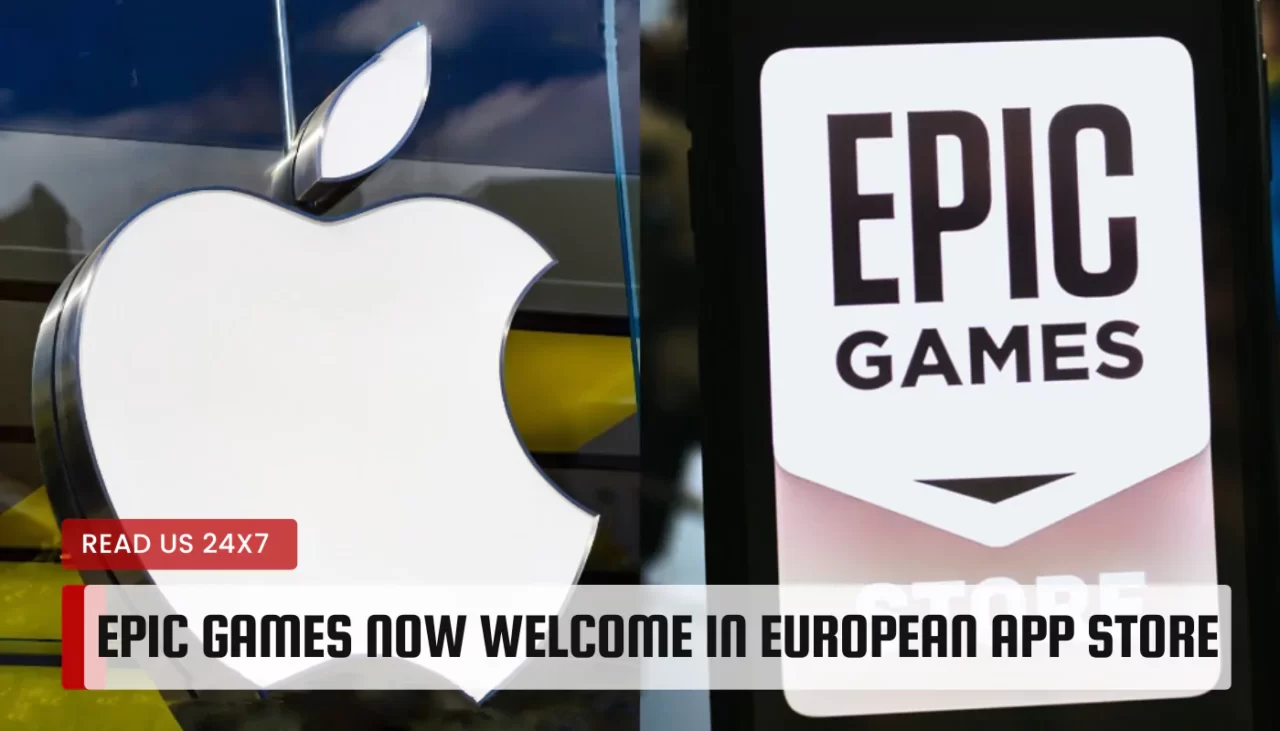Finding the best games for your iPhone just got exciting. Apple has recently made a big move by allowing Epic Games back into its App Store in Europe. This blog will guide you through what this means for gamers and app developers alike.
Keep reading to discover more!
Background of Apple and Epic Games Conflict
Epic Games’ popular app ‘Fortnite’ was removed from the App Store due to conflict with Apple, leading to extensive legal battles. Both companies have been at odds over revenue sharing and in-app payment policies.
Epic Games’ ‘Fortnite’ removed from App Store
The conflict between Apple and Epic Games escalated quickly after Epic introduced a direct payment system in Fortnite to avoid Apple’s 30% fee on in-app purchases. This move directly violated App Store policies, prompting Apple to remove Fortnite from its platform.
This action sparked a series of lawsuits and legal battles, with both sides accusing the other of unfair practices.
Epic Games CEO Tim Sweeney claimed that Apple’s decision to block Fortnite stemmed from retaliation against the company’s lawsuits and criticisms on social media platforms. The dispute highlighted ongoing antitrust issues and developer fees within mobile app stores, raising questions about platform restrictions and revenue share agreements.
Lawsuits and legal battles
Epic Games took a bold step in 2020 by updating their popular game Fortnite, aiming to sidestep Apple’s 30% commission on App Store sales. This move directly challenged Apple’s policies and resulted in Fortnite being removed from the App Store.
In turn, Epic Games launched a lawsuit against Apple in the U.S., sparking a series of legal disputes that drew attention to issues surrounding antitrust regulations, platform restrictions, and developer rights.
Apple retaliated against this challenge by blocking Epic Games’ account in Sweden, as stated by Epic Games CEO Tim Sweeney. This action highlighted the intensity of the conflict between the two companies and underscored broader concerns about revenue sharing and app market competitiveness.
These lawsuits not only brought legal battles into public view but also initiated discussions around potential changes to App Store policies to accommodate more fair treatment of developers.
Apple’s Approval for Epic Games in Europe
Apple’s approval for Epic Games in Europe clears the way for the popular ‘Fortnite’ game to be available once again on the App Store, potentially impacting revenue and competition within the app market.
The decision signals a potential turning point in the ongoing conflict between Apple and Epic Games, with implications for other developers seeking fair treatment on the iOS platform.
What it means for the app market
Apple’s decision to approve Epic Games for its App Store in Europe marks a significant shift in the app market, particularly with the introduction of third-party app stores on iPhones.
This move challenges traditional mobile app distribution channels and paves the way for more developers to offer their apps through alternative means. The European Union’s Digital Markets Act plays a crucial role here, allowing companies like Epic Games to launch their own competing app stores.
As a result, this could vastly change how iPhone users in Europe discover and download apps, potentially leading to increased competition among app providers.
The approval also signals potential changes in revenue models within the industry. With Apple allowed to charge fees for downloads from these third-party stores, both developers and Apple will need to navigate new financial landscapes.
This adjustment may influence how pricing strategies are developed and could encourage more competitive pricing for consumers seeking iPhone apps in the European market.
Next up is an exploration into the potential impact on revenue following these groundbreaking changes.
Potential impact on revenue
Apple’s approval of Epic Games for the European App Store could significantly affect revenue in several ways. The new regulation allowing third-party app stores on iPhones may impact Apple’s revenue from app downloads, as it faces criticism over its charge of half a euro per download.
This issue also affects developers’ potential revenue and raises questions about the platform’s openness for competition. Furthermore, with Epic Games planning to publish Fortnite for iPhones in Europe, both companies could experience fluctuations in revenue due to their ongoing conflict.
The conflict between Epic Games and Apple has broader implications on potential revenue, especially as European regulators impose accountability measures on gatekeeper entities like Apple.
Reaction and Response
Epic Games issued a detailed statement in response to Apple’s decision, expressing optimism and readiness to resume operations with the tech giant. Apple reaffirmed its commitment to fostering a fair and competitive app marketplace, emphasizing the importance of maintaining App Store guidelines for all developers.
Epic Games’ statement
Epic Games CEO Tim Sweeney stated that Apple retaliated against the company by blocking its developer account in Sweden. European regulators’ quick enforcement of the Digital Markets Act led to Apple’s about-face in allowing Epic Games’ developer account, which will be used to publish Fortnite for iPhones in Europe and their own Epic Games store.
Apple’s statement
Apple stated that they are committed to providing a competitive app market and welcome the chance for developers to reach more customers. They emphasized their dedication to maintaining a level playing field and ensuring fair competition.
Apple highlighted the importance of following their App Store guidelines, underscoring that these rules are in place to protect consumers and maintain a secure environment for all users.
Additionally, they expressed willingness to work with regulators and other companies towards creating an innovative digital marketplace that benefits both developers and consumers.
Conclusion
Apple made a significant reversal in allowing Epic Games to operate its app store in Europe, signaling a potential shift in the app market. This decision follows an intense conflict between the two tech giants and sets the stage for a fresh dynamic in app distribution.
The move will likely have broader implications on revenue and competition within the digital marketplace of Europe. Epic’s swift approval underlines Apple’s response to regulatory pressures regarding third-party app stores on iPhones.


